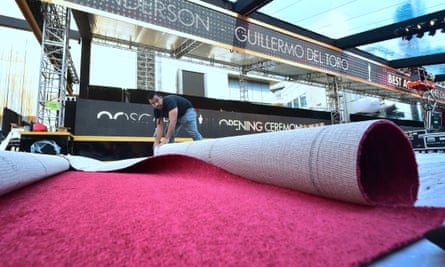In Hollywood, the screenwriter William Goldman once observed, “nobody knows anything”. He was referring to studios not knowing which films will work. These days the industry doesn’t know if even the Oscars will work.
Will the 90th Academy Awards on Sunday successfully juggle politics, glamour and entertainment? Will the ghost of Harvey Weinstein – currently exiled to a rehab centre in Arizona – haunt the ceremony? Will presenters announce the correct winners? Will TV viewers care?
With such questions hanging over Hollywood’s biggest night it is apt no one has the slightest clue whether The Shape of Water, Lady Bird, Get Out or Three Billboards Outside Ebbing, Missouri or some other film will win best picture.
The only certainty among pundits is that The Post, Steven Spielberg’s press freedom battle cry starring Tom Hanks and Meryl Streep, is toast because it feels too much like traditional Oscar bait.
“Things are so disjointed. Everything everyone thought they knew about the Oscars has shifted,” said Sasha Stone, who runs the site Awards Daily. “Our safety zones have been upended and changed. That explains why this race for best picture feels so chaotic.”
The Academy of Motion Picture Arts and Sciences has added younger, more diverse members to the pool of Oscar voters, a widely welcomed move which has made it trickier to know what the academy considers this year’s most zeitgeist plot: race satire, police brutality, female empowerment, gay coming of age, embracing the other?
Nominees have been locked in meetings with publicists, managers, advisers and stylists discussing whether to wear black in solidarity with the #MeToo movement, whether to steer clear of Ryan Seacrest on the red carpet because of a sexual harassment allegation, which he denies, and whether to mention diversity, sexual misconduct, racism, Donald Trump, gun control, LGBT rights and climate change in speeches should they win.
Daniel Day-Lewis’s turn in The Phantom Thread gives him an outside chance to pip Gary Oldman, who channelled Winston Churchill in Darkest Hour, for best actor, but the gossip in the Dolby Theatre will be about different phantoms: Weinstein, Kevin Spacey, Casey Affleck and others absent because of alleged sexual misconduct.
Jimmy Kimmel, returning as host, will try to balance political barbs with humour and reminders that this is, after all, just an award show.
Artists, however, used nearby streets this week to make statements.
A sculpture of Weinstein in a bathrobe sitting on a gold casting couch, clutching an Oscar statuette near his groin, appeared on a corner three blocks from the theatre.

A guerrilla provocateur known as Sabo hijacked three nearby billboards – referencing Martin McDonagh’s nominated film – to challenge Hollywood to tackle child abuse. “And the Oscar for biggest pedophile goes to …” read the first. “We all knew and still no arrests,” said the second. “Name names on stage or shut the hell up!” said the third.
The British artist Zoe Buckman erected a 43ft installation on Sunset Boulevard of a rotating, glowing white uterus with fibreglass boxing gloves in place of ovaries – an exhortation for female solidarity.
For all those hoping for a night free of politics and polarisation there are others willing the ceremony to let rip.
“The more politics the better,” said Bettine Birge, 61, who paused on the Walk of Fame to watch crews erect scaffolding and unfurl red carpet outside the Dolby theatre. “I’m hoping for lots of anti-Trump comment.” The university professor, however, was torn about wanting nominees to wear #MeToo black or go full colour glam.
An unscientific poll of Walk of Fame performers in costume, including Spiderman, Chewbacca and Wonder Woman, found support for Trump bashing. “The entertainment industry can help clean up the White House,” said Donna Martin, dressed as Tinker Bell.
Controversy over all-white acting nominees and gender pay inequality roiled recent Oscars, and protests about Latino exclusion in front of and behind the camera may hit this year’s ceremony, but organisers will have an additional, more prosaic concern: getting the envelopes right.
Naming La La Land as best picture last year instead of the real winner, Moonlight, was the worst blunder in Oscar history: an official backstage was too busy tweeting to focus on giving Warren Beatty the correct envelope.
The academy has banished the culprit and banned his successors from tweeting and ABC, which broadcasts the show, has turned the fiasco into a jokey promotional tool.
“I think it’ll be a great show and I think this time they’ll get it right,” said Michèle Burke, a two-times Oscar winner for makeup who sits on the academy’s executive committee.

Even so, the gowns, tuxedos and thousand-watt smiles will mask a febrile, uncertain mood.
The studio system is in flux, box office revenues are on a rollercoaster, Netflix and Amazon are upending business norms and sexual misconduct allegations are expected to topple more industry figures.
The Oscars are also changing. Once they tended to reward middlebrow, popular fare – Titanic, Forrest Gump, Gladiator, Rain Man – which put mainstream talent on the podium. Over the past decade, however, smaller, indie films like Crash, The Hurt Locker and Moonlight have prevailed.
Great for auteurs, not for ratings.
The US audience for the three-hour broadcast has fallen from 46.3 million in 2000 to 32.9 million last year. Some analysts think that will sink lower this year since most nominated films pulled relatively meagre box office.
“This year’s films if anything are more obscure, the nominated stars less glamorous and buzzy. The hope of witnessing another night of funereal speechifying may be of limited appeal … the net result will likely be audiences scared away by the millions,” said the Ankler, an industry newsletter.
Using “envelopegate” as a promotional tool was shortsighted, it added. “This is the Dream Factory’s pitch for its biggest night? ‘Watch, you never know how we’ll screw up!’”








